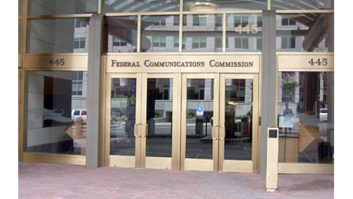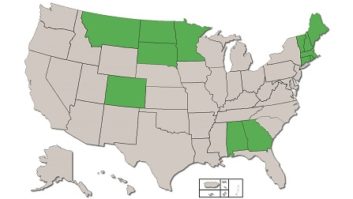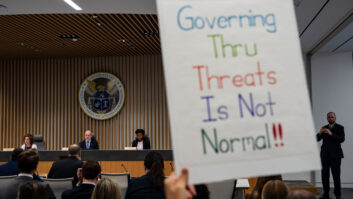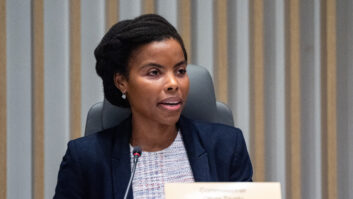The main studio rule is history.
The FCC on Tuesday made another push toward modernizing rules governing the broadcast industry by voting to eliminate the requirement that radio and TV stations must maintain main studios in their communities of license.
The 3–2 vote by the commission, along party lines, scraps a rule that has been around since 1939. The commission said the change gives broadcasters more flexibility in a new digital age that allows those in a community to engage stations via social media and email.
Supporters of the measure believed the current rule was “burdensome and inefficient” and no longer served the public interest. The FCC has been collecting comments on ways to modernize media regulations to eliminate and modify rules that are outdated and burdensome. Opponents scoffed that broadcasters who often preach about the value of localism pushed to remove a rule intended to uphold the concept.
The commission said in a statement, “Elimination of the main studio rule should produce substantial cost-saving benefits for broadcasters that can be directed toward such things as programming, equipment upgrades, newsgathering, and other services that benefit consumers. It will also make it easier for broadcasters to prevent stations in small towns from going dark and to launch new stations in rural areas.”
Chairman Ajit Pai stated that the old rule “would detract from, rather than promote, a broadcaster’s ability and incentive to keep people informed and serve the public interest” considering today’s current technology.
“The overwhelming majority of public input favored our proposal. The record shows that main studios are no longer needed to enable broadcasters to be responsive to their communities of license. That’s because the public these days is much more likely to interact with stations, including accessing stations’ public files online. Additionally, technology allows broadcast stations to produce local news even without a nearby studio,” Pai said.
Commissioners Michael O’Rielly and Brendan Carr, who hold the two other Republican seats, supported the rule change. O’Rielly said, “When (the main studio rule) was implemented nearly 80 years ago, this rule may have made sense. There was no internet, social media or even wireless phones, tools that we now rely on to connect quicker, easier and more frequent with up with another. Today, as the item recognizes, it is more efficient or effective to call or email a broadcast station especially in times of emergency rather than visit the actual studio.”
Commissioner Mignon Clyburn, a Democrat, said by eliminating the main studio rule in its entirety for all broadcast stations, regardless of size or location, the FCC signals that it no longer believes those awarded a license to use the public airwaves should have a local presence in their community. Clyburn said she also fears the rule change will result in job losses.
“Yes, the very same commission that talks about embracing policies to promote job creation is paving the way for broadcast station groups, large and small, to terminate studio staff and abandon the communities they are obligated to serve,” Clyburn said.
Commissioner Jessica Rosenworcel said she does not agree with Pai’s assertion that the rule change will result in broadcasters being able to add more local programming.
“I believe it will hollow out the unique role broadcasters play in local communities, a role that is not just tradition but is an essential part of broadcasting under the Communications Act. I know that many stations face real economic challenges and I wish we could have agreed to simple waivers for the main studio rule any time it would allow small and mid-sized stations to keep the lights on and continue to offer service to their communities of license,” Rosenworcel said.
Today’s action by the FCC does require radio stations to maintain local or toll-free phone numbers for listeners within their community of license to call.
The main part of the rule will take effect 30 days after publication in the Federal Register, expected soon.
Several industry groups quickly reacted to the commission’s elimination of the main studio rule. NAB Executive Vice President of Communications Dennis Wharton said, “NAB supports elimination of the main studio rule, which has outlived its usefulness in an era of mobile news gathering and multiple content delivery platforms. We’re confident that cost savings realized from ending the main studio rule will be reinvested by broadcasters in better programming and modernized equipment to better serve our local communities.”
The Multicultural Media, Telecom and Internet Council, an advocate for minority broadcast interests, congratulated the FCC. “Broadcasters will be able to redirect the significant costs associated with complying with the main studio rule to programming, equipment upgrades, newsgathering, and other services to the benefit of consumers. Repealing the rule will also encourage the launch of new broadcast stations in small towns and rural areas and help prevent existing stations in those areas from going dark,” according to MMTC.







